新人教版七年级英语下册第四单元导学案
人教版七年级下册unit4 070402导学案
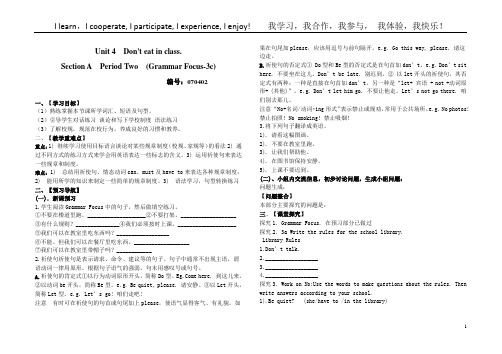
Unit 4 Don't eat in class.Section A Period Two (Grammar Focus-3c)编号:070402一、【学习目标】(1)熟练掌握本节课所学词汇、短语及句型。
(2)引导学生对话练习谈论和写下学校制度语法练习(3)了解校规,规范在校行为,养成良好的习惯和教养。
二、【教学重难点】重点:1) 继续学习使用目标语言谈论对某些规章制度(校规、家规等)的看法2) 通过不同方式的练习方式来学会用英语表达一些标志的含义。
3) 运用祈使句来表达一些规章和制度。
难点:1) 总结用祈使句、情态动词can、must及have to来表达各种规章制度;2) 能用所学的知识来制定一些简单的规章制度。
3) 语法学习,句型转换练习二、【预习导航】(一).新课预习1.学生阅读Grammar Focus中的句子,然后做填空练习。
①不要在楼道里跑。
____________________②不要打架。
___________________ ③有什么规则?_______________④我们必须按时上课。
____________________⑤我们可以在教室里吃东西吗?__________________⑥不能。
但我们可以在餐厅里吃东西。
___________________⑦我们可以在教室里带帽子吗?____________2.祈使句祈使句是表示请求、命令、建议等的句子。
句子中通常不出现主语,谓语动词一律用原形。
根据句子语气的强弱,句末用感叹号或句号。
A.祈使句的肯定式①以行为动词原形开头,简称Do型。
e here. 到这儿来。
②以动词be开头,简称Be型。
e.g. Be quiet, please. 请安静。
③以Let开头,简称Let型。
e.g. Let’s go! 咱们走吧!注意有时可在祈使句的句首或句尾加上please,使语气显得客气、有礼貌。
如果在句尾加please,应该用逗号与前句隔开。
人教版七年级英语下册导学案 Unit4 Don’t eat in class. (2)
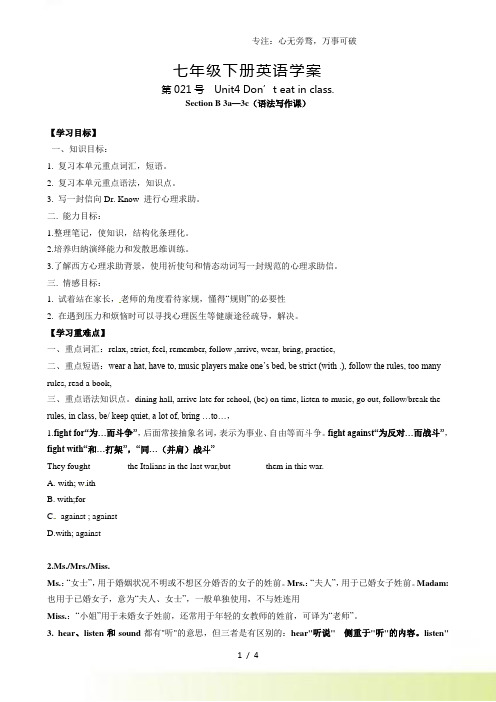
七年级下册英语学案第021号Unit4 Don’t eat in class.Section B 3a—3c(语法写作课)【学习目标】一、知识目标:1. 复习本单元重点词汇,短语。
2. 复习本单元重点语法,知识点。
3. 写一封信向Dr. Know 进行心理求助。
二. 能力目标:1.整理笔记,使知识,结构化条理化。
2.培养归纳演绎能力和发散思维训练。
3.了解西方心理求助背景,使用祈使句和情态动词写一封规范的心理求助信。
三. 情感目标:1. 试着站在家长,老师的角度看待家规,懂得“规则”的必要性2. 在遇到压力和烦恼时可以寻找心理医生等健康途径疏导,解决。
【学习重难点】一、重点词汇:relax, strict, feel, remember, follow ,arrive, wear, bring, practice,二、重点短语:wear a hat, have to, music players make one’s bed, be strict (with .), follow the rules, too many rules, read a book,三、重点语法知识点。
dining hall, arrive late for school, (be) on time, listen to music, go out, follow/break the rules, in class, be/ keep quiet, a lot of, bring …to…,1.fight for“为…而斗争”,后面常接抽象名词,表示为事业、自由等而斗争。
fight against“为反对…而战斗”,fight with“和…打架”,“同…(并肩)战斗”They fought ________the Italians in the last war,but________them in this war.A.with; w ithB. with;forC.against ; againstD.with; against2.Ms./Mrs./Miss.Ms.:“女士”,用于婚姻状况不明或不想区分婚否的女子的姓前。
人教版七年级英语下册Unit4 Don't eat in class导学案
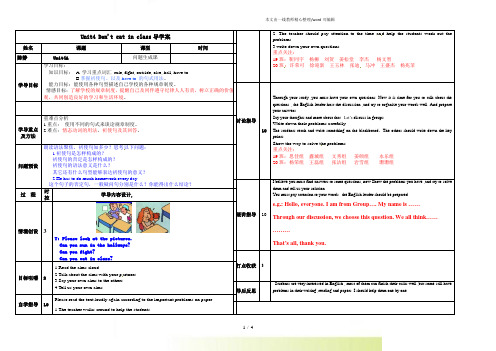
姓名课题课型时间陈静Unit4A 问题生成课学导目标学习目标:知识目标: A 学习重点词汇rule, fight, outside, else, hall, have toB掌握祈使句、以及have to 的句式用法。
能力目标:能使用各种句型描述自己学校的各种规章制度。
情感目标:了解学校的规章制度,提醒自己及同伴遵守纪律人人有责,树立正确的价值观,共同创造良好的学习和生活环境。
学导重点及方法重难点分析1.重点:使用不同的句式来谈论规章制度。
2.难点:情态动词的用法,祈使句及其回答。
问题预设朗读语法聚焦,祈使句知多少?思考以下问题:1.祈使句是怎样构成的?祈使句的否定是怎样构成的?祈使句的语法意义是什么?其它还有什么句型能够表达祈使句的意义?2.He has to do much homework every day.这个句子的否定句,一般疑问句分别是什么?你能得出什么结论?过程时控学导内容设计,情境创设3T: Please look at the pictures.Can you run in the hallways?Can you fight?Can you eat in class?目标咀嚼 2 1.Read the aims aloud.2.Talk about the aims with your p artners.3.Say your own aims to the others.4.Tell us your own aims自学指导10Please read the text loudly again according to the important problems on paper.1.The teacher walks around to help the students.problems3.write down your own questions ..重点关注:19班:靳同宇杨柳刘贺姜松堂李杰杨文智20班:许荣可徐迎新王玉林张迪马冲王盛杰杨兆菲讨论指导10Through your study ,you must have your own questions. Now it is time for you to talk about thequestions , the English leader host the discussion ,and try to organize your words well. And prepareyour answersSay your thoughts and more about that . Let’s discuss in groups.Write down their problems carefully.The students teach and write something on the blackboard。
(新)人教新目标七下 Unit 4 Section A (2a—2d)导学案(推荐)
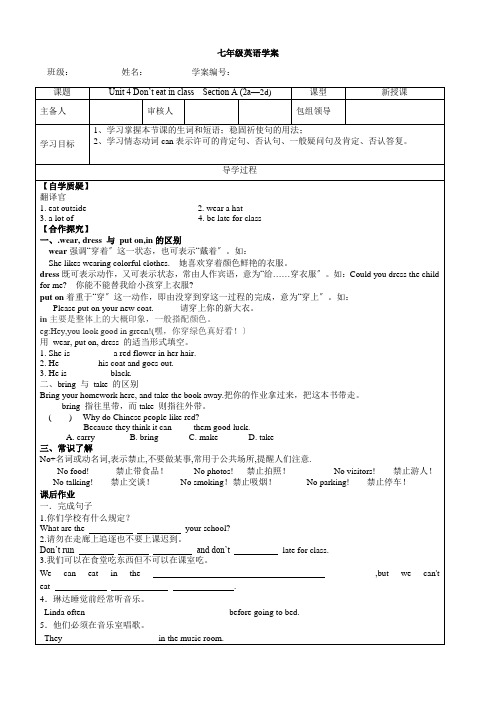
七年级英语学案班级:______ 姓名:______ 学案编号:二.精挑细选( )1. —What are the school rules? —We _______ listen to music in class.A. don’tB. can’tC. aren’t( )2. Don’t________ class.A. be lateB. late forC. be late for( )3. There are ________ rules in our school.( )4.Please ____ some books here for me.A.take B.bring C.give D.talk( )5.It's raining,so we ____ stay at home.A.can B.must C.may D.have to( )6.We must ____ school uniforms.A.put on B.in C.wear D.dress( )7.—I hear you have to get up early every morning.—Right.It's one of the ____ of my family.A.plans B.jobs C.programs D.rules( )8—____ run in the hallways.—Sorry.A.Please B.Do C.Don't D.Does()9.________watch TV. You have to take the piano lesson now.A.Do B.Don't C.Don't do D.Can't do 三、用括号内所给单词的适当形式填空。
1.________(not be) late for class.2.He ________(have) to read English every morning.3.Do you have to ________(wear) school uniforms every day?4.Tony ________(not have) to school every day.5.Please ________(be) quiet in the library.四. 用have to或has to填空1.We clean our classroom after school.2.She make her bed after getting up.3.It’s late. Mr. Beckman go to work by car.4.Emily and Peter join a music club. They practice guitar every day.学习目标:1、重点单词beautiful美丽的friendly友好的cute可爱的shy害羞的smart机灵的scary吓人的live 生活2、重点词组be from来自five years old五岁kind of有点3、重点句式(1) Isn’t it beautiful? 难道它不美丽吗?(2) She’s from Africa.她来自非洲。
(新)人教版七年级英语下册Unit 4 period1 导学案(含答案)
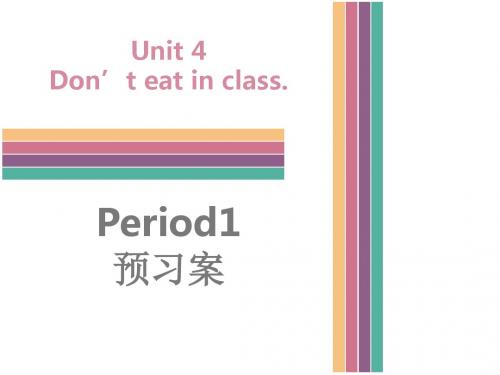
Period1 预习案
目录 contents 学习重点
预习检测 思考探究
目录 contents
学习重点
学习重点
学习重点 单词: rule,arrive,hall,dining,listen,fight,sorry,outsi de,wear,important,bring,quiet 短语:(be)on time,listen to 句型:1.Don’t run in the hallways. 2.Don’t arrive late for class.We must be on time.
思考探究
(3)You have to wear (wear) sports shoes for gym class. (4)Tony has to (have to) play the guitar every afternoon. 否定形式:主语+don’t/doesn’t have to do sth. 常翻译成“没必要做某事,不必……”。 如: (5)Nick doesn’t have to wear a uniform. 尼克不必穿制服。 一般疑问句:Do/Does+主语+have to +动词 原形+其他?
预习检测
bring 7.带来;取来v. ____________ sorry 8.抱歉的;难过的;惋惜的adj. ___________ important 9.重要的adj. ____________ quiet 10.安静的adj. ____________ 11.在外面adv. outside 外面的adj. ____________
预习检测
二、请认真阅读课本,找出以下短语。 be)on time 12.准时____________ listen to music 13.听音乐____________ arrive late for/be late for 14.迟到____________ school rules 15.校规____________ dining hall 16.餐厅____________ class 17.在课堂上in ____________
七年级下册英语第四单元导学案(人教版)

(2)Present key sentences with these pictures.Don't arrive late for class.We must be on time.Don't run in the hallways.Don't cat in the classroom.Don,t listen to music in class. Don't fight.(3)Finish la, and then check the answers.Step 3 ListeningListen and finish lb. Check the answers.Step 4 Pair workTalk about the rules in la.知识探究Don't arrive late for class.不要上课迟到。
(1)本句是一个否认的祈使句,祈使句是以动词原形开头的,表示命令或请求的句子。
其否认句是在动词原形之前加don"。
如:Don't do that again.不要再做那样的事情了。
Don't tell our teachers our secrets.不要告诉我们老师我们的。
(2)肯定的祈使句:①句型:动词原形……(省略主语)。
例如:Look at these holes ! 看这些洞。
②有时,为了加强语气,可以在动词之前加do。
例如:Do be quiet.务必安静。
③用客气的语气表示祈使句时,可在句首或句尾加上please,但如果在句尾加please,那么在please之前一定要加上一个逗号(2)表示允许、许可,“可以”、“能"Can the students run in the hallways?学生们可以在走廊上跑吗?We can eat outside.我们可以在外面吃东西。
Can I come in?我能进来吗?问句中,把can放到主语前面,并且没有人称和数的变化, 巩固提升单项选择()1. —What arc the school rules?—We_ listen to music in class.A. don'tB. can'tC. aren't()2. Don't class.A. be lateB. late forC. be late for()3. There are rules in our school.A. a lots ofB. a lot ofC. lot of选择相应的短语补全对话A: We have a lot of rules in our school.B: [A: Don't eat in the classroom. Don't run in the hallways. Don't listen to music in the classroom.2B:3Read the sentences in Grammar Focus and try to remember them by heart.Step 3 Practice(1)Check the answers in 3a. Read the sentences.(2)Check the answers in 3b. Read the sentences.Step 4 ConsolidationMake up five cool rules for a dream school. Vote for the Cook st School.知识探究What do you have to do ?你们必须做什么?have to与其他情态动词一样后接动词原形,表示客观上的需要,强调被迫性,有“不得不”的含义。
人教七年级下册Unit4导学案设计(有答案)
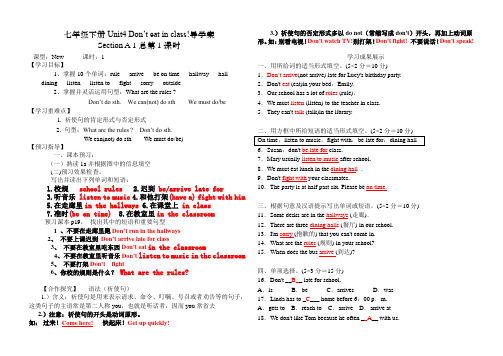
七年级下册Unit4 Don’t eat in class!导学案Section A 1总第1课时课型:New 课时:1【学习目标】1、掌握10个单词:rule arrive be on time hallway halldining listen listen to fight sorry outside2、掌握并灵活运用句型:What are the rules ?Don’t do sth. We can(not) do sth We must do/be【学习重难点】1. 祈使句的肯定形式与否定形式2. 句型:What are the rules ? Don’t do sth.We can(not) do sth We must do/be)【预习指导】一、课本预习:(一)熟读1a并根据图中的信息填空(二)预习效果检查。
写出并读出下列单词和短语:1.校规school rules2.迟到be/arrive late for3.听音乐listen to music4.和他打架(have a)fight with him5.在走廊里in the hallways6.在课堂上 in class7.准时(be on time) 8.在教室里in the classroom预习课本p19,找出其中的短语和重要句型1 、不要在走廊里跑Don’t run in the hallways2、不要上课迟到Don’t arrive late for class3、不要在教室里吃东西Don’t eat in the classroom4、不要在教室里听音乐Don’t listen to music in the classroom5、不要打架Don’t fight6、你校的规则是什么?What are the rules?【合作探究】语法(祈使句)1.)含义:祈使句是用来表示请求、命令、叮嘱、号召或者劝告等的句子,这类句子的主语常是第二人称you,也就是听话者,因而you常省去2.)注意:祈使句的开头是动词原形。
新版人教版七年级下册Unit4Don27teatinclass导学案
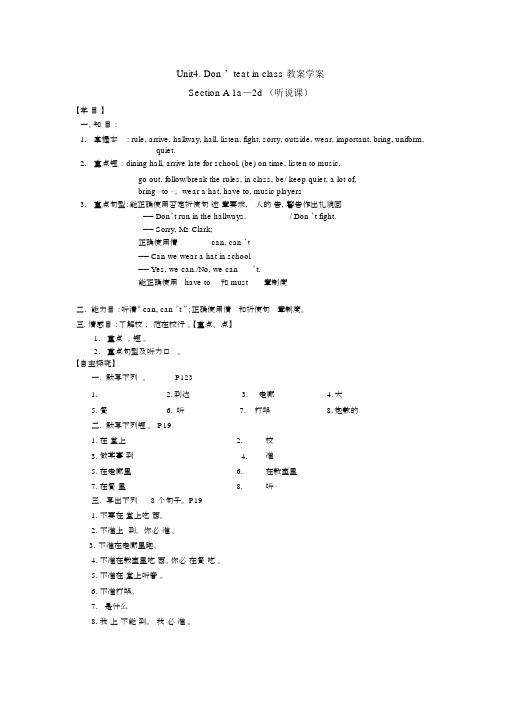
Unit4. Don ’teat in class 教案学案Section A 1a—2d (听说课)【学目】一、知目:1.掌握本 : rule, arrive, hallway, hall, listen, fight, sorry, outside, wear, important, bring, uniform,quiet.2.重点短: dining hall, arrive late for school, (be) on time, listen to music,go out, follow/break the rules, in class, be/ keep quiet, a lot of,bring ⋯to ⋯, wear a hat, have to, music players3.重点句型:能正确使用否定祈使句述章要求,人的告,警告作出礼貌回—— Don’t run in the hallways./ Don ’t fight.—— Sorry, Ms Clark;正确使用情can, can ’t—— Can we wear a hat in school—— Yes, we can./No, we can’t.能正确使用have to和must章制度二.能力目:听清“ can, can ’t ”;正确使用情和祈使句章制度。
三. 情感目:了解校,范在校行。
【重点、点】1.重点,短。
2.重点句型及听力口。
【自主探究】一. 默写下列。
P1231.________2.到达 ________3.走廊 ________4.大 ________5.餐 ________6.听 ________7.打架 ________8.抱歉的 ________二. 默写下列短。
P191.在堂上 _________________2.校 _________________3.做某事到 _________________4.准 _________________5.在走廊里 _________________6.在教室里 _________________7.在餐里 _________________8.听⋯ _________________三. 写出下列8 个句子。
2023年人教版七年级英语下册Unit 4 Don’t eat in class 课时1导学案

教师寄语:Unit 4 Don't eat in class.Section A(1a-2c) 课时1导学案【学习目标】一、New words: rule; hallway; classroom; fight; outside; dining hall; Must be;二、Targe t language: 1. Don’t arrive late for class. 2. Don’t run in the hallway.3. Don’t eat in the classroom.4. Don’t listen to music in the classroom or the hallway.5. Don’t fight.三、学习祈使句的用法。
【预习内容】一、预习1a和2a,词汇翻译。
1.在课堂上吃东西2.上学迟到3.在走廊上跑4.在外面听音乐5.在餐厅里6必须_________7在课上听音乐_____________8 及时,按时_____________9 戴帽子_______________10 打架________________二、根据首字母或汉语提示写单词。
1. There are many r in my family.2.We can’t run after others in the (走廊).3.Jim, don’t (打架)with your classmates.4. It’s snowing now. Don’t go (外面).三.句型体验1 不要上课迟到。
____________________________________________2.我们必须准时上课。
_____________________________________________3.我们可以在教室吃东西吗?不行,但我们可以在餐厅吃。
_____________________________________________________________4 不要打架。
人教版七年级英语下册Unit4 Don’t eat in class!导学案

七年级下册Unit4 Don’t eat in class!导学案Section A班级:姓名:时间:年月日【学习目标】1、掌握10个单词:rule arrive be on time hallway hall dining listen listen tofight sorry outside2、掌握并灵活运用句型:What are the rules ?Don’t do sth. We can(not) do sth We must do/be【学习重难点】1. 祈使句的肯定形式与否定形式2. 句型:What are the rules ? Don’t do sth.We can(not) do sth We must do/be)【预习指导】写出并读出下列单词和短语:1.校规2.迟到3.听音乐4.和他打架5.在走廊里6.在课堂上7.准时 8.在教室里预习课本p19,找出其中的短语和重要句型1 、不要在走廊里跑______________________2、不要上课迟到___________________________3、不要在教室里吃东西___________________4、不要在教室里或走廊里听音乐_____________5、不要打架______________6、你校的规则是什么?________________【合作探究】语法(祈使句)1.)含义:祈使句是用来表示请求、命令、叮嘱、号召或者劝告等的句子,这类句子的主语常是第二人称you,也就是听话者,因而you常省去2.)注意:祈使句的开头是动词原形。
如:过来!快起床!3.)祈使句的否定形式多以do not(常缩写成don't)开头,再加上动词原形。
如:别看电视!别打架!不要说话!学习成果展示一、根据汉语意思完成句子。
1、我们必须准时到校。
We ________ get to school ________ ________.2、不要在走廊上奔跑。
(新)人教新目标版七下 Unit 4-4 导学案(精品)
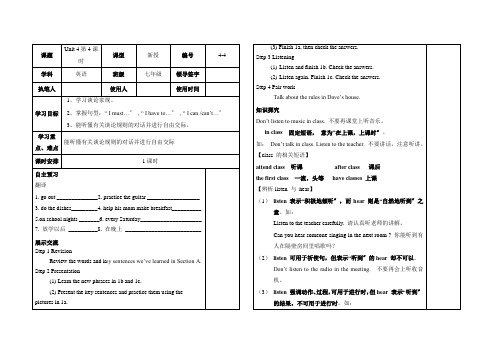
第四课时Section B (3a—3c ) & self check学习目标:1、重点单词beautiful美丽的friendly友好的cute可爱的shy害羞的smart机灵的scary吓人的live 生活2、重点词组be from来自five years old五岁kind of有点3、重点句式(1) Isn’t it beautiful? 难道它不美丽吗?(2) She’s from Africa.她来自非洲。
(3) I like Becky because she is smart and friendly.我喜欢Becky因为她很机灵和友好。
(4) She lives in Blackwood Zoo.她住在黑木动物园。
重点难点:1. 准确使用形容词描述动物特点;2. 描述动物的生存现状。
导学设计:1. Isn’t she beautiful? 她难道不美丽?【归纳】否认的一般疑问句,常用来表示反问、责备或者说话人的看法或惊异的情绪,意为“〞,其结构为“连系动词be/助动词/情态动词否认形式+主语+其他?〞Can’t you play football?你难道不会踢足球吗?Aren’t you from America? 你难道不是来自美国吗?【拓展】答复否认的一般疑问句,假设是肯定答复,用Yes开头,后面需要用肯定形式;假设是否认答复,用No开头,后接否认形式。
翻译时,Yes译为“不是〞;No译为“是的〞。
例如:---Doesn’t he have a bik e? 难道他没有一辆自行车?---Yes, he does. / No, he doesn’t. 不,他有。
/ 是的,他没有。
2. She is twelve years old.她12岁了。
be+数词+years old常用来表示年龄,意为“〞。
例如:My sister is 13 years old.提问年龄用疑问短语How old。
七年级英语下册unit4导学案(3,22)人教新课标版
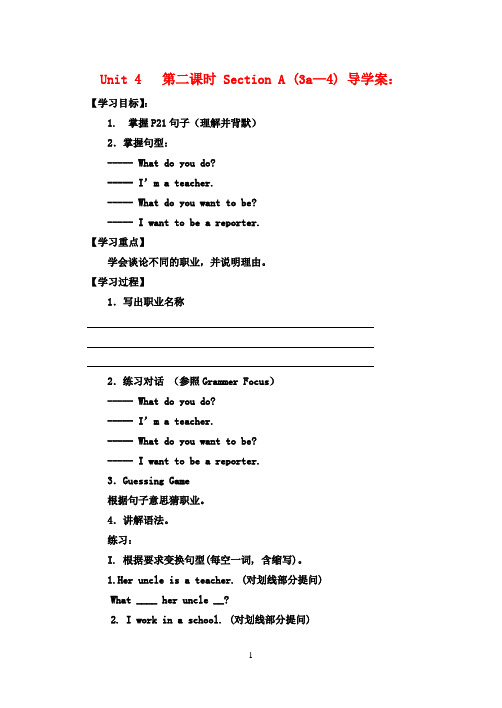
Unit 4 第二课时 Section A (3a—4) 导学案:【学习目标】:1. 掌握P21句子(理解并背默)2.掌握句型:----- What do you do?----- I’m a teacher.----- What do you want to be?----- I want to be a reporter.【学习重点】学会谈论不同的职业,并说明理由。
【学习过程】1.写出职业名称2.练习对话(参照Grammer Focus)----- What do you do?----- I’m a teacher.----- What do you want to be?----- I want to be a reporter.3.Guessing Game根据句子意思猜职业。
4.讲解语法。
练习:I. 根据要求变换句型(每空一词, 含缩写)。
1.Her uncle is a teacher. (对划线部分提问)What ____ her uncle __?2. I work in a school. (对划线部分提问)________ you work?3.Sam wants to be a policeman. (对划线部分提问) _________ Sam ____ to be?Ⅱ. 根据汉语提示用英语完成句子(每空一词)。
1. 你可以从银行取钱。
You can ___ money ____ the bank.2. 他总是穿一件白衬衣。
He always _____ a white shirt.3. 汤姆经常帮助我学英语。
Tom often helps me _______________ English.。
- 1、下载文档前请自行甄别文档内容的完整性,平台不提供额外的编辑、内容补充、找答案等附加服务。
- 2、"仅部分预览"的文档,不可在线预览部分如存在完整性等问题,可反馈申请退款(可完整预览的文档不适用该条件!)。
- 3、如文档侵犯您的权益,请联系客服反馈,我们会尽快为您处理(人工客服工作时间:9:00-18:30)。
【课题】Unit 4 Don’t eat in class【学习目标】:1.学习识记本单元中的重点词组及单词。
2.初步理解本单元中重点单词及词组的用法。
【要点和难点】理解掌握重点单词及词组的用法。
【导学指导】(一)自主学习写出并读出下列单词和短语:校规迟到听音乐重要的in the hallway Don’t fight. listen to music arrive late for class外出______________ 清洗餐具____________ 铺床_______________(对某人)要求严格___________________ 遵守规则_____________________到达_________ 准时____________ 餐厅_________________(二). 合作探究1. arrivev. 到达。
是不及物动词,常用的短语为“arrive at +小地点”和“arrive in +点”;arrive 后如果加副词,at/ in 省略。
get to +地点指到达某地,to 后如果接副词,则to 省略。
reach 意为“到达”可直接跟宾语。
例1)I am always the first to ________ _________ the school.2) They usually ________the school at five o’clock.2. listen v. 听,倾听,指听的动作,为不及物动词,可以单独使用,但其后如接宾语则加介词tohear 表示听到,是指听得结果例2. __________! Can you ________ anything? 听!你能听到什么?3. fight v. n. 打架;战斗。
相关短语:fight about fight with fight againstfight about 意为“为…..而战”“就….争吵”该短语后接名词代词或宾语从句,表示吵架的原因。
fight with 意为“与…..作战;与….打架”, with 后接表示人的名词或代词做宾语。
fight against 意为“抵抗…..;对抗……”例3. We often _________ __________ who plays with the doll first. 我们常为谁先玩玩具娃娃而争吵。
Don’t ________ ________ your classmates. 不要和你的同学吵架。
_________ __________ poverty 与贫困作斗争。
4. put on; wear; in; dressput on 指穿上,戴上,强调穿衣的动作,其反义词组是take off, 后接代词it/ them 时,代词需放在词组中间。
wear 指穿着,戴着。
强调穿衣的状态。
in 指穿着,戴着,后接表示颜色衣服的词,相当于wearing.dress 指穿衣服,表示动作,dress sb 给某人穿衣服,dress 做不及物动词时,表示“穿好衣服。
例4 Please ____________ __________ your coat. 请穿上你的外套。
He _________glasses. 他戴着眼镜。
The boy ______ red coat is my brother. 穿红色外套的男孩是我的弟弟。
Get up and __________ quickly. 起来快穿好衣服。
【课堂练习】(一) 基础达标A) 根据句意及首字母提示完成单词。
1. Don’t break r______in the school library.2. Nick is very friendly to everyone. He never f_______.3. It’s time for lunch. Let’s go to the d_______ hall.4. Don’t run in the h_______. It’s a little dangerous.5. We often have our PE class in the g when it rains.6. Every Sunday our mother w__________ the clothes of all the family.8. Don’t stay o___________. It’s too cold. Come in!9. Dogs like to bark(吠叫) ____________(大声的)if there is a stranger(陌生人).10. They came back from Beijing two days l .(二)巩固提升B) 用所给单词的适当形式完成句子。
1. Can those students _______ (have) lunch at home?2. Look at the sign(标志) on the wall! It says “No _________ (swim)!”3. __________ (do) your homework and don’t watch TV.4. Boys and girls all need to wear sports ________(shoe) for gym class.5. On (child) Day, we played a lot of games and (have) much fun.6. Please practice (play) the guitar every day.7. I’m so tired. Let’s stop (write) and take a rest.8. He (find) boy (cry)last Sunday.9. Don’t talk ____________(loud) in the meeting room【课题】Unit 4 Don’t eat in class【学习目标】:1. 学习section B 部分的课文。
2. 理解课文件的容。
3. 学会写有关规则的文章及复习如何写一封信。
【要点和难点】学会写有关规则的文章及复习如何写一封信。
【导学指导】(一)自主学习预习课文,用 have to, must 及can 和can’t 填空。
1.Molly ______________ play basketball on school days, but she __________ playit on weekends.2.Molly ___________ do her homework first when she gets home.3.Molly __________ read a book after dinner before she ___________ watch TV.4.At school, Molly ____________ be noisy or eat in class.5.Parents and schools make rules to help students. So students___________ followthe rules.(二). 合作探究1. There are too many rules! 有太多的规定。
too many 意为太多的。
其中心词是many,too 修饰many 以加强语气,too many用来修饰可数名词复数。
too much意为太多的。
其中心词是much,too 修饰much 以加强语气,too much用来修饰不可数名词。
much too 意为非常,太。
是副词性短语,中心词是too, much 修饰too 以加强语气。
much too 用以修饰形容词或副词。
例1. I have ________ __________ questions to ask.There is _________ __________ rain in the south.This dress is _________ _________ expensive.2. At school, we have more rules…在学校,我们有更多的规定….more 在此是many 的比较级,意为更多的。
它还有“又,再,别的,额外的”意思,常放在some, a little, a few, a lot 以及数词的后面。
“名词+more”表示“再来….”。
例 2. I want to stay here for five___________ days. 翻译:____________________________Please give her some ____________. 翻译:________________________________.3. Parents and schools are sometimes strict…父母和学校有时是严格的…sometimes 是副词,意为有时,相当于 at times, 一般位于系动词,助动词,情态动词之后,实义动词之前,也可放于句首。
some times 意为几次,几倍。
some time 意为一段时间。
例3. ____________ she is happy ; ___________ is sad.I have been to Beijing ________ ___________.Don’t worry! There is _______ _______ left.4. …, and I have to keep my hair short…., 而且我必须留短发。
keep 意为保持,后接形容词,“ keep + 名词+ 形容词”指“保持某种状态”。
keep + 宾语+ v. ing 指“使…保持某种状态”。
keep doing sth 或keep on doing sth 继续(一直,老是,反复)做某事。
例4. I’m sorry to ________ you waiting.They decided to ________ trying.【课堂练习】(一) 基础达标1.-Why are you walking so fast? Because I get home to do my work.A. haveB. go toC. have toD. has to2. You go in a hurry(匆忙).There’s enough time left.A. have t oB. hadn’tC. don’t have toD. mustn’t3.Sorry, I can’t it in English. I can only Chinese.A. speak, talkB. say, tellC. say, speakD. talk, say4.-Can you cook dinner? . It’s easy.A. No, I can’tB. Yes, I canC. No, I canD. Yes, I need(二)巩固提升根据句意及首字母提示补全单词1.My mother asked me to do the d_________ after dinner yesterday evening.2.We can’t go out on school n___________.3.We must go to bed b_________ ten o’clock in the evening.4.It’s n_________ in the classroom. Please don’t talk.5.The students should do some r_______ in the morning.6.My parents are s_________ with me.7.We must f__________ these rules.8.R__________ to wait for me at the school gate tomorrow morning.【课题】Unit 4 Don’t eat in class【学习目标】:1. 复习本单元的重点词汇及短语。
